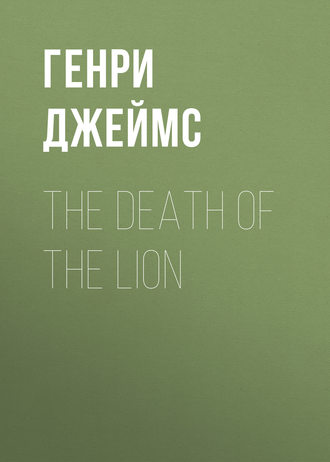 полная версия
полная версияThe Death of the Lion
What happened at Prestidge later in the day is of course contemporary history. If the interruption I had whimsically sanctioned was almost a scandal, what is to be said of that general scatter of the company which, under the Doctor’s rule, began to take place in the evening? His rule was soothing to behold, small comfort as I was to have at the end. He decreed in the interest of his patient an absolutely soundless house and a consequent break-up of the party. Little country practitioner as he was, he literally packed off the Princess. She departed as promptly as if a revolution had broken out, and Guy Walsingham emigrated with her. I was kindly permitted to remain, and this was not denied even to Mrs. Wimbush. The privilege was withheld indeed from Dora Forbes; so Mrs. Wimbush kept her latest capture temporarily concealed. This was so little, however, her usual way of dealing with her eminent friends that a couple of days of it exhausted her patience, and she went up to town with him in great publicity. The sudden turn for the worse her afflicted guest had, after a brief improvement, taken on the third night raised an obstacle to her seeing him before her retreat; a fortunate circumstance doubtless, for she was fundamentally disappointed in him. This was not the kind of performance for which she had invited him to Prestidge, let alone invited the Princess. I must add that none of the generous acts marking her patronage of intellectual and other merit have done so much for her reputation as her lending Neil Paraday the most beautiful of her numerous homes to die in. He took advantage to the utmost of the singular favour. Day by day I saw him sink, and I roamed alone about the empty terraces and gardens. His wife never came near him, but I scarcely noticed it: as I paced there with rage in my heart I was too full of another wrong. In the event of his death it would fall to me perhaps to bring out in some charming form, with notes, with the tenderest editorial care, that precious heritage of his written project. But where was that precious heritage and were both the author and the book to have been snatched from us? Lady Augusta wrote me that she had done all she could and that poor Lord Dorimont, who had really been worried to death, was extremely sorry. I couldn’t have the matter out with Mrs. Wimbush, for I didn’t want to be taunted by her with desiring to aggrandise myself by a public connexion with Mr. Paraday’s sweepings. She had signified her willingness to meet the expense of all advertising, as indeed she was always ready to do. The last night of the horrible series, the night before he died, I put my ear closer to his pillow.
“That thing I read you that morning, you know.”
“In your garden that dreadful day? Yes!”
“Won’t it do as it is?”
“It would have been a glorious book.”
“It is a glorious book,” Neil Paraday murmured. “Print it as it stands—beautifully.”
“Beautifully!” I passionately promised.
It may be imagined whether, now that he’s gone, the promise seems to me less sacred. I’m convinced that if such pages had appeared in his lifetime the Abbey would hold him to-day. I’ve kept the advertising in my own hands, but the manuscript has not been recovered. It’s impossible, and at any rate intolerable, to suppose it can have been wantonly destroyed. Perhaps some hazard of a blind hand, some brutal fatal ignorance has lighted kitchen-fires with it. Every stupid and hideous accident haunts my meditations. My undiscourageable search for the lost treasure would make a long chapter. Fortunately I’ve a devoted associate in the person of a young lady who has every day a fresh indignation and a fresh idea, and who maintains with intensity that the prize will still turn up. Sometimes I believe her, but I’ve quite ceased to believe myself. The only thing for us at all events is to go on seeking and hoping together; and we should be closely united by this firm tie even were we not at present by another.









